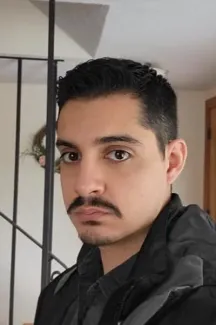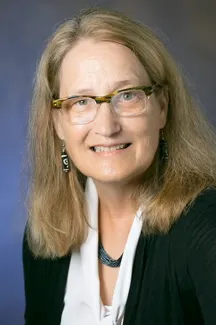When history graduate student Daniel Rodriguez applied for the Summer Bridge Program, created by the Humanities Without Walls initiative to give PhD students an opportunity to work for community organizations, he knew that he wanted to create change but he had no idea how close to home his project would be.

As Rodriguez spent the summer working with the Greater Community AIDS Project (GCAP), he found himself reinvigorating a project that had idled since the passing of one of his past professors at U of I.
Rodriguez’s research focuses on LGBTQ+ history, specifically in the 20th century. As he prepared to enter his fourth year of graduate studies, he wanted to spend his summer contributing to the GCAP mission of advocacy and history preservation.
He wound up working on an archival project that was originally created by the late history professor Kathryn Oberdeck—a long-time, well-liked faculty member who Rodriguez took a class with during his first year at the U of I.
Oberdeck was a pioneer in public history at the University of Illinois whose commitment to collaborative and inclusive community-focused scholarship was reflected throughout her entire academic career. Shortly before she died in 2022 after a battle with cancer, Oberdeck received the Campus Excellence in Public Engagement award, which honored her work to connect students and the community with the history of Champaign-Urbana.
The archival project that Rodriguez joined was designed to allow history students to learn more about queer history through GCAP. Oberdeck’s passing, however, meant that the work being conducted to organize and consolidate historical GCAP documents came to a halt—until Rodriguez became involved this past summer.

“The project sounded incredible,” Rodriguez said. “I thought it would be so cool to work on this thing Kathy had been working on before she passed away and help finish this project that they desperately needed,” Rodriguez said.
GCAP, founded in 1985, was created during the growing AIDS epidemic by the local Urbana-Champaign gay community with the goal of preventing its spread in East Central Illinois through education.
Jerry Carden, GCAP cofounder, initiated the relationship between the organization and Oberdeck after the professor had told him that some of her students in her History Harvest class wanted to learn more about queer history. History Harvest was part of a project to bring together community members to preserve and share local history.
“I enjoy working with students immensely,” Carden said. “My husband and I were not in the generation where gay couples had kids. So I really relish these interactions with younger people and working with them through GCAP.”
Carden has seen the AIDS epidemic take the lives of people close to him, and he felt it was important to keep the history of it alive. When Rodriguez began working with GCAP through the Summer Bridge Program, Carden knew that this was a chance for Oberdeck’s project to come back to life and for their archives to be made accessible to the community.
Rodriguez contributed by scanning and categorizing massive numbers of pamphlets, photos, news articles, and other documents, contributing greatly to the archives project that had been at a standstill. The work has also inspired Rodriguez to continue to explore new avenues of purpose for his PhD outside of academia.
While the summer program has come to an end, Rodriguez decided to continue working with Carden and GCAP this fall as a volunteer.
“Working with GCAP gave me one of those moments like, ‘Wait, maybe this is something I could use my skills for,’” Rodriguez explained. “It felt like putting two and two together in a way I had never done before.”
He added: “Working with them was a way for me to explore the work I’ve done as a humanities graduate student and how I could use it in ways that aren’t solely academic. I’m using my time learning and writing about queer and trans communities and I’m now working for an organization primarily serving those communities.”
This article is reposted from the College of Liberal Arts & Sciences website.